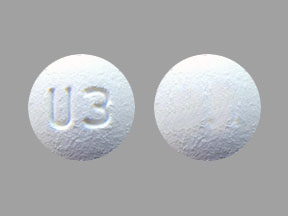Brigatinib Disease Interactions
There are 3 disease interactions with brigatinib.
Brigatinib (applies to brigatinib) liver dysfunction
Moderate Potential Hazard, Moderate plausibility. Applicable conditions: Liver Disease
Following a single dose of 90 mg, unbound brigatinib systemic exposure was 37% higher in subjects with severe hepatic impairment (Child-Pugh C) compared to subjects with normal hepatic function. It is recommended to reduce the dose by approximately 40% (i.e., from 180 mg to 120 mg, 120 mg to 90 mg, or from 90 mg to 60 mg) in these patients. No dose adjustment is recommended for patients with mild hepatic impairment (Child-Pugh A) or moderate hepatic impairment (Child-Pugh B).
Brigatinib (applies to brigatinib) pulmonary toxicity
Moderate Potential Hazard, Moderate plausibility. Applicable conditions: Pulmonary Impairment, Interstitial Pneumonitis
Severe, life-threatening, and fatal pulmonary adverse reactions consistent with interstitial lung disease (ILD)/pneumonitis have occurred with the use of brigatinib. It is recommended to monitor for new or worsening respiratory symptoms (e.g., dyspnea, cough, etc.), particularly during the first week of initiating this drug. Withhold brigatinib in any patient with new or worsening respiratory symptoms, and promptly evaluate for ILD/pneumonitis or other causes of respiratory symptoms (e.g., pulmonary embolism, tumor progression, and infectious pneumonia). Dose modifications or permanent discontinuation may be necessary.
Brigatinib (applies to brigatinib) renal impairment
Moderate Potential Hazard, Moderate plausibility. Applicable conditions: Renal Dysfunction
Following a single dose of 90 mg, unbound brigatinib systemic exposure was 86% higher in subjects with severe renal impairment [creatinine clearance (CrCl) 15 to 29 mL/min] compared to subjects with normal renal function. It is recommended to reduce dose by approximately 50% (i.e., from 180 mg to 90 mg, or from 90 mg to 60 mg) in these patients. No dose adjustment is recommended for patients with mild or moderate renal impairment [creatinine clearance (CrCl) 30 to 89 mL/min].
Switch to professional interaction data
Brigatinib drug interactions
There are 666 drug interactions with brigatinib.
Brigatinib alcohol/food interactions
There is 1 alcohol/food interaction with brigatinib.
More about brigatinib
- brigatinib consumer information
- Check interactions
- Compare alternatives
- Side effects
- Dosage information
- During pregnancy
- Drug class: multikinase inhibitors
- Breastfeeding
- En español
Related treatment guides
Drug Interaction Classification
| Highly clinically significant. Avoid combinations; the risk of the interaction outweighs the benefit. | |
| Moderately clinically significant. Usually avoid combinations; use it only under special circumstances. | |
| Minimally clinically significant. Minimize risk; assess risk and consider an alternative drug, take steps to circumvent the interaction risk and/or institute a monitoring plan. | |
| No interaction information available. |
See also:
Further information
Always consult your healthcare provider to ensure the information displayed on this page applies to your personal circumstances.


